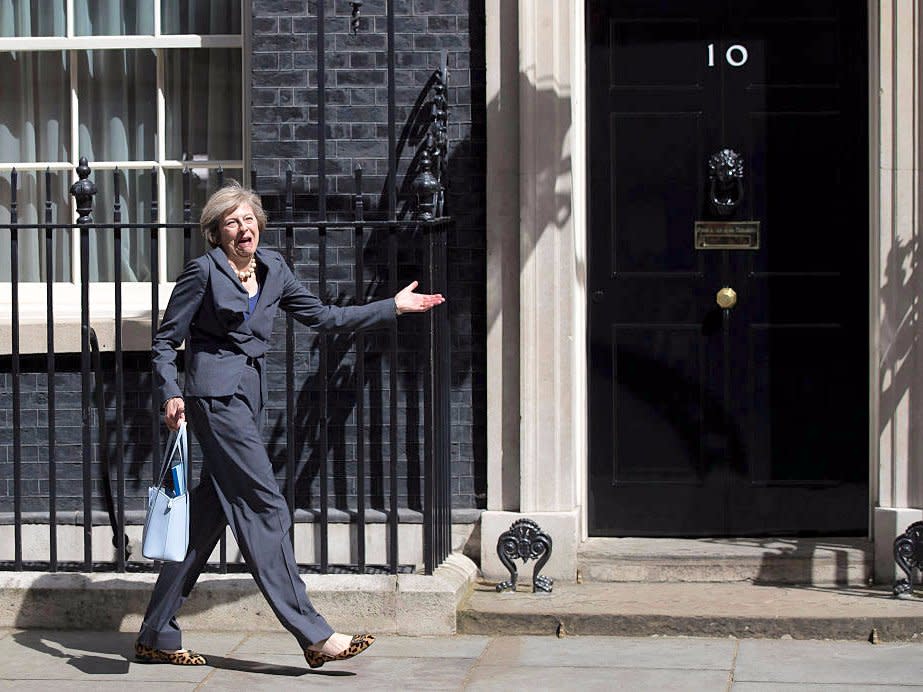HSBC: Britain should consider staying in the EEA to manage 'fiendishly complex' Brexit trade talks

Carl Court / Getty
LONDON — Britain should look at a so-called off-the-shelf option for trade, such as staying in the European Economic Area, as it transitions out of the European Union, analysts at banking giant HSBC said.
HSBC's UK economics team, comprising Simon Wells, Douglas Lippoldt, and George House, suggested that the "fiendishly complex" nature of signing a comprehensive trade agreement with the bloc could push the government to try and secure a deal that allows the UK to stay in the EEA for a brief period to ease leaving.
"Given that time is short and that the task is fiendishly complex, an off-the-shelf solution has appeal, in our view – even if only for the transitional period. One possibility could be to remain in the European Economic Area (EEA), although this may be politically difficult," the team write in their note, titled "Ambition and Transition."
Here's the rationale behind that possibility, put forward by HSBC's team (emphasis ours)
The UK is already a member of the EEA. And, the EEA provides a framework for open and stable trade relations between EU countries and Norway, Iceland, and Liechtenstein. It also ensures a degree of regulatory alignment (e.g., Norway has implemented in its domestic law and regulation about 75% of the EU legal requirements affecting the EEA operation). This would help to limit some of the trade policy risks of Brexit.
Moreover, as the EEA is an existing agreement, many businesses and government officials are familiar with its operation. This would help to minimise the increase in complexity that needs to be managed. Of course, the fact that this solution would require continued free movement of labour between the UK and other EEA members makes it politically difficult.
Theresa May and her key Brexit lieutenants have consistently and continually said that the UK will not remain within the European Single Market — a condition of EEA membership. Therefore, to do so would require a huge u-turn from the government.
This would not be new to May, who had consistently denied that she would call an early election before doing so in April, but would still be very difficult, particularly given her weak, DUP backed government.
May's slender parliamentary majority means only a handful of hardline Brexiteers would need to rebel against May on the issue to cause a disastrous government collapse, something that is very clearly an undesirable outcome for May, and the wider UK.
However, if May could manage to navigate the political hurdles of staying in the EEA, it could be among the best options for the UK's economy going forward.
Another option, HSBC notes, is for the UK to increase the use of so-called Free Trade Zones (FTZs) to boost trade.
"These zones could be developed as areas outside of the UK customs regime, although remaining subject to appropriate UK standards and regulations (e.g., safety, health, worker rights)," HSBC writes.
"By minimising the imposition of UK trade requirements, an FTZ would enable businesses to trade more freely with partners in the EU and beyond."
HSBC's commentary comes in the week that the government confirmed it wants to negotiate a transitional customs union deal with the European Union in order to prevent cross-border business coming to a standstill after Brexit.
After the news was briefed to press on Tuesday morning, the Department for Exiting the EU (DExEU) published its official plan to leave the customs union in March 2019 and negotiate a totally "new" customs relationship with the EU, which would "minimise disruption" and be as "frictionless" as possible.
The British side hopes the EU will agree to a bespoke, time-limited customs arrangement, which will protect the UK economy from a "cliff-edge" Brexit and allow businesses to carry on as normal during an interim period, according to the position paper, which you can read in full here.
"The proposed model, which would mean close association with the EU Customs union for a time-limited period, would ensure that UK businesses only have to adjust once to a new customs relationship. This would minimise disruption and offer business a smooth and orderly transition," DExEU said in a press release.
May and her Cabinet want to retain as many benefits of customs union membership as possible without being part of it — possibly via a "temporary customs union." Britain will go into talks pursuing "the freest and most frictionless possible trade in goods between the UK and the EU," the paper says.
NOW WATCH: A $16 billion hedge fund CIO gives an easy explanation of quantitative trading
See Also:
BANK OF AMERICA: Markets are too optimistic about Britain's Brexit deal
The pound won't hit parity with the euro even if the Tory government collapses
DON'T MISS: UBS: The pound is 'extremely undervalued'

 Yahoo News
Yahoo News 

